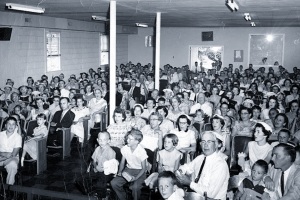Christians Launch 'Doing the Right Thing' Movement
ASHBURN, Va. – America is in what evangelical leader Chuck Colson is calling an "ethical mess" and it's time for Christians and the rest of the population to start "doing the right thing."
Tens of thousands of Christians from across the country tuned in to a live webcast on Saturday to witness the launch of the "Doing the Right Thing" movement. The grassroots movement is being led by Colson, who believes an ethics revolution is "desperately needed."
Unfortunately, Christians and the majority of the American population have been afraid to speak up and have allowed the "cultural elite" to force them into silence, Colson said.
"The vast majority of people just listen to what a small group that run the culture talk about – the elite," the founder of Prison Fellowship said.
"I think we're intimidated," he commented.
But, he stressed, "there is time to get a movement of people ... who aren't willing to sit in the spiral of silence but want to speak out and want to make a difference around them."
It's all relative?
The Prison Fellowship founder was joined by a distinguished panel of Christian leaders on Saturday who spoke of the individualism, the relativism, and the overall lack of moral courage in America today.
Part of what's feeding the ethical crisis today is the prevailing culture of relativism, or what Del Tackett calls "the silly mind game that we play in order to convince ourselves that truth ultimately springs from me."
"It’s the selfish nature of man that desires nothing more than to get his own way," Tackett, who formerly served in the George H. W. Bush administration, explained.
He went on to demonstrate how relativism has in turn led to "the society covenant," where everyone must abide by "this philosophical thing that we call tolerance."
"If I don't tell you what you're doing is wrong, then you don't tell me [what I'm doing is wrong]" is how the covenant works.
"We think that we can each, therefore, get our own way without restraining or without guilt or without condemnation," said Tackett, who currently serves as chief spokesperson for Focus on the Family's The Truth Project.
To say something is "wrong" is to break the covenant; to say there is absolute truth is also unacceptable.
Eric Metaxas, New York Times bestselling author of Amazing Grace and Bonhoeffer, observed that the concept of Truth is openly mocked.
"If I talk about Truth with a capital 'T' I may as well declare myself a jihadist who will cut your head off if you don't do what I say," the author and host of Saturday's event stated.
"Most people when they hear Truth in our culture, immediately the walls go up because they say 'that's your truth, it makes me uncomfortable fundamentally.'"
Many are convinced that their own heart or their conscience is the source of moral authority.
Rather than looking at God or even reason, as the panelists believe, many are turning to Oprah or Dr. Phil who tell them to "just look inside," John Stonestreet of Summit Ministries said during the four-hour event.
But "telling someone to look inside is like telling someone to find themselves out of a wilderness using a compass that always points at them," Stonestreet pointed out.
"Everywhere they turn they’re the center of reality. If you’re the center of reality you’re lost. You have to have a fixed reference point … of what’s true and what’s right."
Colson agreed, saying he himself needs accountability.
"The conscience … is often our subjective reaction to something. ‘I feel OK about it;’ no, you better check your conscience against what is objectively true," he stressed.
The fact is, according to Stonestreet, sometimes one's feelings are wrong.
Don't give in to the belly
So the question is: "How do we become people who do what’s right in the face of powerful incentives to do what’s wrong?" Stonestreet posed.
Practice.
Citing C.S. Lewis' "The Abolition of Man," Stonestreet said heads are being filled with knowledge and bellies with passion but many are without a chest.
"The head is the seed of the reason and the belly is the seed of the appetite and as Lewis said the head is no match for the belly. The belly always wins," he summed.
What is needed is the chest or moral courage. And the chest is a muscle that needs to be worked out. "We have to lift the weight of making the right decision," said Stonestreet.
Professor Robert George, who is considered one of the most influential conservative Christian thinkers, weighed in on the panel discussion on how to do the right thing.
It's not enough just to know what is the right thing but doing the right thing is key.
"If you want to be a good person, if you want a child to be a good person, you have to habituate that child to doing good," said George, who is currently McCormick Professor of Jurisprudence at Princeton University.
"It's not that you're taking over his will and turning him into an automaton," he clarified. "You're helping him to dynamically orient himself through his own free choices in the direction where doing good becomes easier and easier."
Doing good or bad the first time is the hardest, he explained.
While one might feel the "pang of conscience" the first time one does a bad act, it gets easier each successive time until "there seems to be no call of conscience at all."
The same goes for one who does good. It gets easier.
"You can be Hitler going down the wrong path and Mother Teresa going down the right path," George pointed out.
The world's going to hell?
The Doing the Right Thing movement is based on a DVD series that has already made its way into homes, churches and prisons.
With the ongoing economic crisis, the breakdown of families, and the prevalence of greed and corruption, Colson is hoping Americans, Christians especially, will step up to start an ethics revolution – one based not just on the Bible but on common sense, the common law and the common good.
Stonestreet commented that it's easy to take the perception that "the world’s going to hell and there’s nothing we can do about it."
But "Doing the Right Thing," he said, brings hope to the table.
Colson urged, "If we care as Christians, as I do, and passionately about the culture around us, if Calvin was right – when the church is the church it automatically transforms the culture around us – then we've got to do our job."
As Christians spread the word, Colson also cautioned against angry rants.
"Too many times we Christians are bashing people over the head telling people what’s wrong. No. We can’t impose our views we aren’t theocrats as you hear us described in the press. What we can do is propose," he highlighted.
"It’s like you don’t got any reason to be mad at a secularist any more than you would at a blind man who stepped on your foot, as one of my friends once said."
"Speak out not in an angry way of shaking the fist, speak out in a way saying 'let me help you see ... this is a better way to live.'"





























